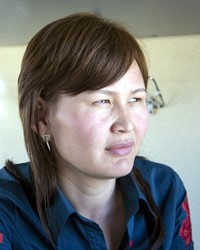Kazakh in Korea, South

Photo Source:
Petar Milošević - Wikimedia
Creative Commons
|
Send Joshua Project a map of this people group.
|
| People Name: | Kazakh |
| Country: | Korea, South |
| 10/40 Window: | No |
| Population: | 12,000 |
| World Population: | 17,966,900 |
| Primary Language: | Kazakh |
| Primary Religion: | Islam |
| Christian Adherents: | 0.80 % |
| Evangelicals: | 0.40 % |
| Scripture: | Complete Bible |
| Ministry Resources: | Yes |
| Jesus Film: | Yes |
| Audio Recordings: | Yes |
| People Cluster: | Kazakh |
| Affinity Bloc: | Turkic Peoples |
| Progress Level: |
|
Introduction / History
The Kazakhs, a Turkic people, are the second largest Muslim people group of Central Asia. In times past, they may have been the most influential of the various Central Asian ethnic groups. Most of the Kazakhs live in Kazakhstan. Large communities can also be found in Mongolia, Ukraine and Russia. In more recent years, small numbers of Kazakhs have migrated to other countries like South Korea. The Kazakhs developed a distinct ethnic identity in the late fifteenth and early sixteenth centuries. Several of their clans formed a federation that would provide mutual protection. As other clans joined the federation, its political influence began to take on an ethnic character. During the nineteenth century, the Russians acquired Central Asia through a steady process of annexation. They eventually claimed the entire territory of Kazakhstan. Tragically, about half of the Kazakh population was killed during the Russian Civil War of the 1920s and 1930s. During this time, many fled to China and Mongolia.
What Are Their Lives Like?
Kazakhstan faced an economic downturn in 2015, and some of them have been seeking work outside their country. Though only about one in 1,000 Kazakhs live in South Korea, this number might increase in the years to come. Typically, Kazakhs enter South Korea as tourists. They have to be well-dressed so they appear to be wealthy. When possible, they get low-level jobs as cooks or construction workers, often living (basically camping) at their worksites or living in basements. Since they are in South Korea illegally, they are always in danger of being found and sent out of the country. They need employment, even low paying jobs, so they are willing to leave their families to get paid jobs in South Korea. There are similar situations for migrants from Nepal, Thailand and Myanmar.
What Are Their Beliefs?
Kazakhs embraced Islam during the sixteenth century and still consider themselves Muslim today. Changes in Kazakh society (mainly from a nomadic to a settled lifestyle) and an attempt by the Soviets to suppress religious freedoms have led the people to adopt Islam more closely. However, their Islamic practices have been combined with traditional folk religions. Traditional Kazakh folk religion includes beliefs in spirits. They practice animism and ancestor worship. Animism is the belief that non-human objects have spirits. Ancestor worship involves praying and offering sacrifices to deceased ancestors. Today, Kazakhs continue to consult shamans (priests who cure the sick by magic, communicate with the spirits, and control events). They also practice various traditional rituals before and after marriage, at birth, and at death. These kinds of beliefs are similar to traditional Korean spirituality. However, there is a strong movement of Christ in South Korea, and Korean believers can easily reach out to the Kazakhs.
What Are Their Needs?
Kazakhs in South Korea need job training. They need South Korean believers to take them the life changing gospel.
Prayer Points
Pray for the Lord to provide for their needs according to His riches and glory. Pray for workers to go to the Kazakhs who will help them spiritually and economically. Pray for a spiritual hunger that will lead Kazakhs to embrace the ways of Jesus Christ. Pray for a movement to Christ among Kazakhs in South Korea that will spread to Kazakhstan.